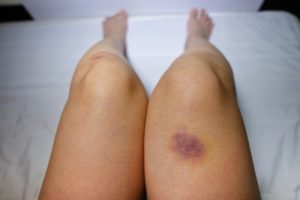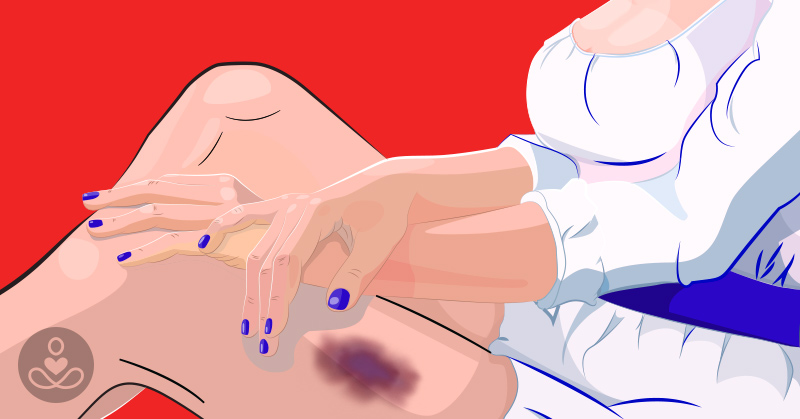Bruising occurs when capillaries or small blood vessels near the skin’s surface break and leak red blood cells. Much of the time, we are well aware as to what causes bruising, such as a fall, a knock, or something more serious. Though, in some cases, identifying the cause of our bruises is not so easy.
If you’re noticing bruises popping up that you can’t account for, it’s important to find their cause. Here are 8 potential reasons why you may be bruising easily.
What Causes Bruising?
1- Age
As we age, our body’s fat tissue naturally begins to thin and our blood vessels lose some elasticity. As a result, the body does not absorb impact as well as it used to and bruising is likely to occur (1).
2- Diabetes
Diabetes can interfere with blood circulation throughout the body. Diabetes can lead to hyperglycemia, too much glucose in the blood, over time this can damage blood vessels and cause bruising (2).
Bruising related to diabetes may be accompanied by the following symptoms, excessive thirst, blurred vision, fatigue, difficulty fighting infection and extensive healing time for bruises. If you notice any of these symptoms it may indicate diabetes, visiting a doctor is recommended (2).
3- Medications
Bruising can be the result of certain medications. The most commonly linked medication with bruising is aspirin. Additional medications associated with bruising are blood thinners, antidepressants, analgesics, anti-inflammatories, iron-containing and anti-asthmatic medicine. These medications reduce the blood’s ability to clot, as a result, bleeding for any reason may extend longer than usual, leading to bruising.
If you notice bruising during use of medications, speak with your doctor. Changing medications or suspending use may be necessary to avoid internal bleeding (3).
4- Lack Of Nutrients
Vitamin C which plays a vital role in creating new tissue, iron helps support capillaries, vitamin K is responsible for coagulation, vitamin B12 has a role in red blood cell production and vitamin P (flavonoids) can assists with production of collagen. A deficiency in any of these vital nutrients can weaken the skin or blood vessels, leaving someone prone to bruising easily (4).
To determine if nutrient deficiency is the source of your bruising, consult your doctor for an assessment of your levels and a possible treatment plan.
5- Sun Damage
Over time, extensive sun exposure can weaken blood vessel walls and the skin. As a result, bruising becomes easier to occur.
Topical creams containing retinol or alpha-hydroxy acid may be useful in reducing the appearance of these bruises. Bruising from sun damage reinforces the requirement for sun protection when possible (5).
6- Blood Disorders
Von Willebrand disease is a common bleeding disorder usually brought on by genetics. The disease affects the body’s ability to clot, leaving people susceptible to bruising easily. Other blood diseases associated with bruising are varicosis, hemophilia, leukemia, and thrombocytopenia.
Bruising caused by blood disorders may be accompanied by symptoms such as pain, swollen legs, bleeding gums, small capillary spots on the body or nosebleeds. Don’t hesitate to visit your doctor to be tested for blood disorders.
7- Vigorous Exercise
Muscles put through strenuous weight lifting or strain may lead to bruising. Some people can acquire bruises from even moderate exercising, indicating that blood vessels were already weak. In this case, light exercising provided the finishing touch needed to cause bruising.
If you are engaging in physical activity or exercise, ensure you are staying within your limits and take breaks when necessary.
8- Purpuric Dermatosis
A condition in which leaky capillaries cause reddish-brown lesions to appear on the skin. Purpuric dermatosis generally occurs in the lower extremities and may be asymptomatic or pruritic (cause itching).
The cause of purpuric dermatosis is not currently known. Specialised blood tests and even allergy testing may be required to find the cause (6).
Topical steroids may help control itching. Additional options to manage purpuric dermatosis include compression stockings, oral medications, and phototherapy (7).
When To Seek Medical Attention For Bruising

The duration for a bruise to heal varies by individual and cause. In most instances, bruises come and go, without raising any alarm bells. However, there are occasions when a bruise requires medical attention, including the following scenarios (8).
- If a bruise does not improve within 2 weeks.
- If after 4 weeks there is still discoloration and pain.
- If bruising easily occurs or there is no known cause.
- If there is potential the bruises were caused by blood thinning medication.
- If a bruise is painful under a toenail or fingernail.
Natural Remedies To Heal Bruising

For whatever reason bruising appears, the appearance may not be very welcome. With discoloration, swelling or possibly an odd placement, you may be eager for bruising to heal. Over time, healing will occur on its own. To help speed up the healing process, a variety of natural remedies are available.

Sources
- https://www.health.harvard.edu/staying-healthy/why-do-i-bruise-more-easily-as-i-age
- https://www.health.com/skin-conditions/why-do-i-bruise-so-easily#aging-bruising-easily
- https://www.dermcoll.edu.au/atoz/pigmented-purpuric-dermatosis/
- https://rarediseases.info.nih.gov/diseases/7609/pigmented-purpuric-dermatosis
- https://www.webmd.com/skin-problems-and-treatments/guide/bruises-article#2

